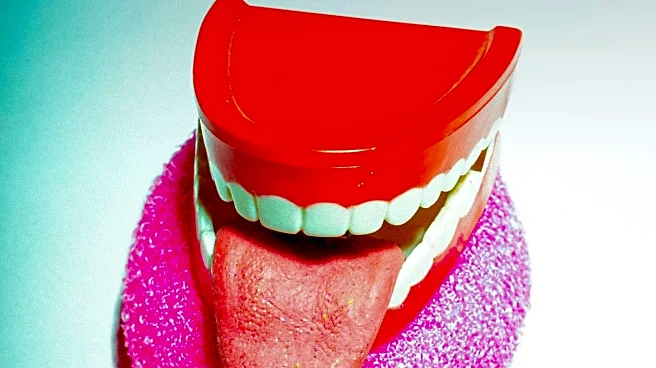What's Happening?
Recent studies published in Neurology Open Access have identified a potential link between gum disease and an increased risk of stroke and brain damage. Researchers found that adults with gum disease are
more likely to exhibit signs of damage to the brain's white matter compared to those without gum disease. Dr. Souvik Sen, the study's author, explained that gum disease is associated with higher inflammation levels, which have been connected to arteriosclerosis and hardening of small blood vessels. Another study led by Sen revealed that individuals with both gum disease and cavities face an 86% higher risk of stroke than those with healthy oral conditions. The findings suggest that maintaining oral health through regular brushing, flossing, and dental visits can significantly reduce stroke risk.
Why It's Important?
The findings underscore the importance of oral health in preventing cardiovascular issues, particularly strokes. With over 795,000 strokes occurring annually in the U.S., according to the American Heart Association, the potential to reduce this number through improved oral hygiene is significant. The research highlights the broader implications of oral health on overall health, suggesting that preventative dental care could play a crucial role in reducing healthcare costs and improving quality of life. As gum disease and cavities affect 3.5 billion people globally, the study emphasizes the need for public health initiatives focused on oral health education and access to dental care.
What's Next?
The studies call for further research to establish a causal relationship between oral health and stroke risk. Healthcare providers may begin to incorporate oral health assessments into cardiovascular risk evaluations, potentially leading to new guidelines for stroke prevention. Public health campaigns could be developed to raise awareness about the importance of oral hygiene in preventing serious health conditions. Additionally, dental professionals might see an increased demand for preventative care services as the public becomes more aware of the connection between oral health and overall well-being.
Beyond the Headlines
The research opens discussions on the ethical and policy implications of integrating dental care into broader healthcare systems. It challenges the traditional separation between dental and medical health services, advocating for a more holistic approach to patient care. This could lead to policy changes that ensure dental care is covered under health insurance plans, making it more accessible to underserved populations. The findings also highlight cultural dimensions, as oral health practices vary widely across different communities, necessitating tailored public health strategies.









